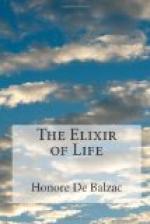During that brief pause a door opened; and as once the Divine presence was revealed at Belshazzar’s feast, so now it seemed to be manifest in the apparition of an old white-haired servant, who tottered in, and looked sadly from under knitted brows at the revelers. He gave a withering glance at the garlands, the golden cups, the pyramids of fruit, the dazzling lights of the banquet, the flushed scared faces, the hues of the cushions pressed by the white arms of the women.
“My lord, your father is dying!” he said; and at those solemn words, uttered in hollow tones, a veil of crape seemed to be drawn over the wild mirth.
Don Juan rose to his feet with a gesture to his guests that might be rendered by, “Excuse me; this kind of thing does not happen every day.”
Does it so seldom happen that a father’s death surprises youth in the full-blown splendor of life, in the midst of the mad riot of an orgy? Death is as unexpected in his caprice as a courtesan in her disdain; but death is truer—Death has never forsaken any man.
Don Juan closed the door of the banqueting-hall; and as he went down the long gallery, through the cold and darkness, he strove to assume an expression in keeping with the part he had to play; he had thrown off his mirthful mood, as he had thrown down his table napkin, at the first thought of this role. The night was dark. The mute servitor, his guide to the chamber where the dying man lay, lighted the way so dimly that Death, aided by cold, silence, and darkness, and it may be by a reaction of drunkenness, could send some sober thoughts through the spendthrift’s soul. He examined his life, and became thoughtful, like a man involved in a lawsuit on his way to the Court.
Bartolommeo Belvidero, Don Juan’s father, was an old man of ninety, who had devoted the greatest part of his life to business pursuits. He had acquired vast wealth in many a journey to magical Eastern lands, and knowledge, so it was said, more valuable than the gold and diamonds, which had almost ceased to have any value for him.
“I would give more to have a tooth in my head than for a ruby,” he would say at times with a smile. The indulgent father loved to hear Don Juan’s story of this and that wild freak of youth. “So long as these follies amuse you, dear boy——” he would say laughingly, as he lavished money on his son. Age never took such pleasure in the sight of youth; the fond father did not remember his own decaying powers while he looked on that brilliant young life.
Bartolommeo Belvidero, at the age of sixty, had fallen in love with an angel of peace and beauty. Don Juan had been the sole fruit of this late and short-lived love. For fifteen years the widower had mourned the loss of his beloved Juana; and to this sorrow of age, his son and his numerous household had attributed the strange habits that he had contracted. He had shut himself up in the least comfortable wing of his palace, and very seldom left his apartments; even Don Juan himself must first ask permission before seeing his father. If this hermit, unbound by vows, came or went in his palace or in the streets of Ferrara, he walked as if he were in a dream, wholly engrossed, like a man at strife with a memory, or a wrestler with some thought.




